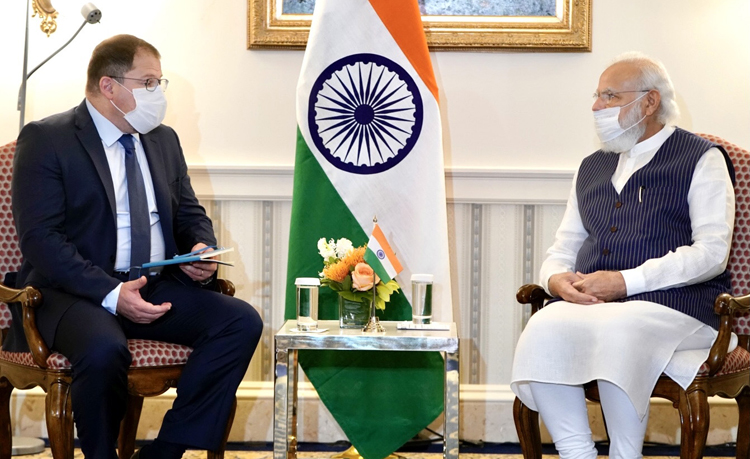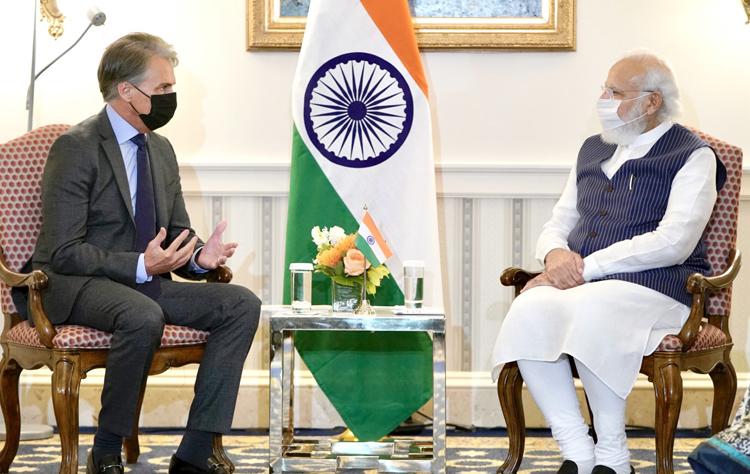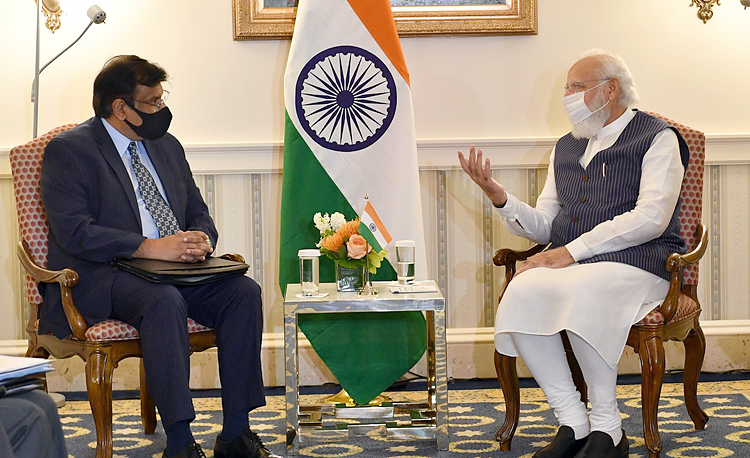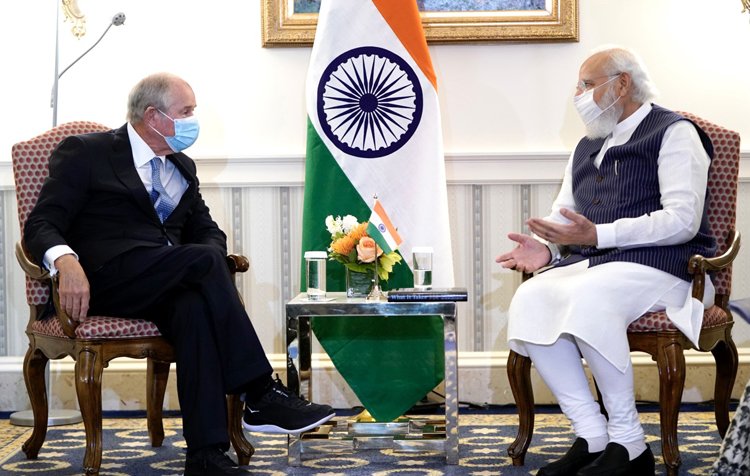INDIAN ARMED FORCES CHIEFS ON OUR RELENTLESS AND FOCUSED PUBLISHING EFFORTS

The insightful articles, inspiring narrations and analytical perspectives presented by the Editorial Team, establish an alluring connect with the reader. My compliments and best wishes to SP Guide Publications.

"Over the past 60 years, the growth of SP Guide Publications has mirrored the rising stature of Indian Navy. Its well-researched and informative magazines on Defence and Aerospace sector have served to shape an educated opinion of our military personnel, policy makers and the public alike. I wish SP's Publication team continued success, fair winds and following seas in all future endeavour!"

Since, its inception in 1964, SP Guide Publications has consistently demonstrated commitment to high-quality journalism in the aerospace and defence sectors, earning a well-deserved reputation as Asia's largest media house in this domain. I wish SP Guide Publications continued success in its pursuit of excellence.
- Prime Minister Modi Visits Punjab’s Adampur Air Base, Interacts with Airmen after Successful ‘Operation Sindoor’; Stern Message to Pakistan
- The layered Air Defence systems that worked superbly, the key element of Operation Sindoor
- Operation Sindoor | Day 2 DGMOs Briefing
- Operation Sindoor: Resolute yet Restrained
- India's Operation Sindoor Sends a Clear Message to Terror and the World – ‘ZERO TOLERANCE’
- Japan and India set forth a defence cooperation consultancy framework, talks on tank and jet engines
Prime Minister Modi Meets Global CEOs
The excellent initiative taken by the Prime Minister in meeting with the CEOs of global firms will help improve the technological prowess of India, improve the economy, contribute towards Atmanirbhar Bharat and open up more employment opportunities
 |
The Author is Former Director General of Information Systems and A Special Forces Veteran, Indian Army |
The first engagement by Prime Minister Narendra Modi, during his recent visit to the US commencing September 23, 2021 was to hold back-to-back power-packed meetings with top Chief Executive Officers (CEOs) of global firms in five different key sectors. Modi held talks with the CEOs of General Atomics, Qualcomm, Adobe, First Solarand Blackstone. The Prime Minister’s aim was quite clear which included: attracting huge investments and bringing state-of-the-art technologies to India; inform the CEOs about the recently launched Production Linked Incentive Scheme (PLI) in India, and; signal a positive shift as India pushes towards more opportunities in key sectors.

PM Modi first met Cristiano R. Amon, President and CEO of Qualcomm Incorporated. Qualcomm develops semi-conductors, software, wireless technology-related services and already has a large presence in India. Amon showed keenness to work in India’s ambitious digital transformation programmes including in 5G, Prime Minister’s Wi-Fi Access Network Interface Scheme (PM WANI) and others. Amon also expressed interest in partnering India in the field of semiconductors and said, “It’s the right time for India to not only manufacture for the Indian market, but also plan to serve the need of other countries.”
Cristiano R. Amon, President and CEO of Qualcomm showed keenness to work in India’s ambitious digital transformation programmes including in 5G, Prime Minister’s Wi-Fi Access Network Interface Scheme (PM WANI) and in partnering India in the field of semi-conductors
PM Modi said since Qualcomm has trusted Indian talent already through participation in NAVIK, it can start manufacturing in India. He also apprised Amon of India’s liberalised drone policy and that Qualcomm could take part in new opportunities. Both discussed investment opportunities offered in India’s telecommunications and electronics sector including the PLI for Electronics System Design and Manufacturing (ESDM) and developments in the semiconductor supply chain in India.

Next, Modi met Shantanu Narayen, Chairman and CEO of Adobe, a multinational computer software corporation. Narayen expressed interest to contribute in India’s 75th anniversary of independence, and said he wanted to bring video, animation to every child in India. Modi told Narayen that the ground for digital education had been laid in the pandemic era and it was time to move forward. Discussions also focused on India’s flagship programme Digital India, and use of emerging technologies in sectors like health, education and R&D. Both laid emphasis on creating centres of excellence in Artificial Intelligence (AI) in India.
Shantanu Narayen, Chairman and CEO of Adobe, expressed interest to contribute in India’s 75th anniversary of independence, and said he wanted to bring video, animation to every child in India
In the PM’s discussion with Mark Widmar, CEO of First Solar, solar panel manufacturer and producer of utility-scale PV power plants and related services, Modi spoke about ‘One world, one sun and one grid’ initiative, India’s target of 450 GW of renewable energy, India’s focus on manufacturing for solar energy, India’s green hydrogen mission and said that companies in the field of solar energy can take maximum advantage of India’s PLI schemes. Both agreed on enhancement in manufacturing of Solar in India.

Prime Minister Modi next held discussions with Vivek Lall, CEO of General Atomics (GA). Lall is a prominent Indian-American aerospace and defence expert who played a key role in some of the major defence deals between India and the US. GA is one of the world's leading privately held nuclear and defence companies with research and development focused on energy and defence. Lall lauded advancements in India’s space programme as also policies and reforms in the field of drones. Modi spoke about opportunities in the field of manufacturing due to the PLI scheme. Lall also said that India is an attractive destination for manufacturing of drones and that a dedicated drone hub can be created in India to support the entire ecosystem of drones. Both also discussed strengthening the defence technology sector in India.

Drones are being used widely in India ranging from Aerial Mapping of the entire country under the ‘SWAMITVA’ to delivering medicines to Rural areas in Telangana under the “Medicines from the Sky” project. Significantly, Indian drone company Johnnette Technologies Pvt Ltd signed a deal with a company of Ghana for drone training and manufacturing drones in Ghana and increase job opportunities.
Vivek Lall, CEO of General Atomics said that India is an attractive destination for manufacturing of drones and that a dedicated drone hub can be created in India to support the entire eco system of drones
Finally, PM Modi met Stepehn A. Schwarzman, CEO of Blackstone. Blackstone is one of the largest private market investors in India, managing around $50 billion of market value. India is Blackstone’s most profitable market in terms of returns; its seed investment of around $25 billion is worth over $50 billion at present, Schwarzman talked about Blackstone’s investment in India and their plans to further ramp it up. Modi spoke of the huge scope for further expansion of Blackstone’s partnership in India, elaborated on the reforms undertaken and emphasised on Asset Monetisation and Bad Bank.

In a concurrent development in the aerospace sector, Boeing has awarded a contract to India-based Dynamatic Technologies for manufacturing assemblies for its tactical fighter 'F-15EX Eagle II'. This is the first instance in which aero-structures for F-15EX Eagle II will be made in India. Dynamatic Technologies will supply the F-15EX aero-structure assembly requirements from FY2022. The company will manufacture these aero-structures from their manufacturing facility in Bengaluru.
This is the first instance in which aero-structures for F-15EX Eagle II will be made in India by Dynamatic Technologies
Boeing India President Salil Gupte says, “We see tremendous potential for India to contribute to the global aerospace industry as an industrial and technology partner. The award of aero-structure assemblies for the latest and most advanced version of the F-15 aircraft family is a reflection of Boeing's focus on Atmanirbhar Bharat and a testimony to the world class capability of our industrial partners in India."
The excellent initiative taken by Prime Minister Narendra Modi in meeting with the CEOs of global firms in five different key sectors will help improve the technological prowess of India, improve the economy, contribute towards Atmanirbhar Bharat and open up more employment opportunities which too is very essential; the recent exit of auto giants from India has reportedly caused the loss of 64,000 jobs.
The global giants in America will like to go all out for investing and partnering with India but it is the US Administration and the US Congress that must be liberal towards sharing latest technology with India while they talk of the importance of the partnership with India, natural partners being the two biggest democracies and the like. Nuclear–powered submarine technology is being given to Australia while India is still looking for state-of-the-art aerospace engine technology. Conversely, the US has accorded a technological bonanza to China by abandoning aircraft and helicopters in Afghanistan (3 x C-130 aircraft, 23 x light attack aircraft, 33 x AC-208 aircraft, 43 x MD-530 helicopters, 33 x UH Blackhawk helicopters and 32 x Mi-17 helicopters) all which China will reverse engineer and share the technology with Pakistan and other partner nations.





